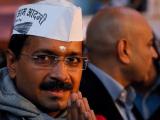New Delhi, Jan 7: Cracking down on corruption in Delhi Jal Board, the city government today suspended three officials of the water distribution utility and shifted around 800 others in a bid to streamline its service delivery mechanism.

Urban development and PWD minister Manish Sisodia said that "By initiating action, we have tried to give out a strong and clear message to all officials that they have to understand that days of corruption are over and it is a governance of clean politics."
He said cases will be filed against the three officials.
In a massive reshuffle in the water distribution utility, around 800 officials were transferred in the first major decision by the AAP government to streamline the jal board.
The action came ten days after DJB CEO Debashree Mukherjee was shifted on December 28 soon after Kejriwal took oath as Chief Minister.
Aam Aadmi Party had been voted to power in the national capital on a wave of promises, including providing 700 litres of free water per household.
Sources said transfer orders have been issued following a direction from the Chief Minister who is the chairperson of the Jal Board.
They said the Chief Minister had issued specific directions to revamp the service delivery mechanism of Delhi Jal Board, following which the transfers have been effected.
"Transfer orders for around 800 officials were issued today to improve service delivery," officials said.
"All those officials who have worked for over three years in a particular place have been transferred to a different place," a senior DJB official said.






Comments
Add new comment